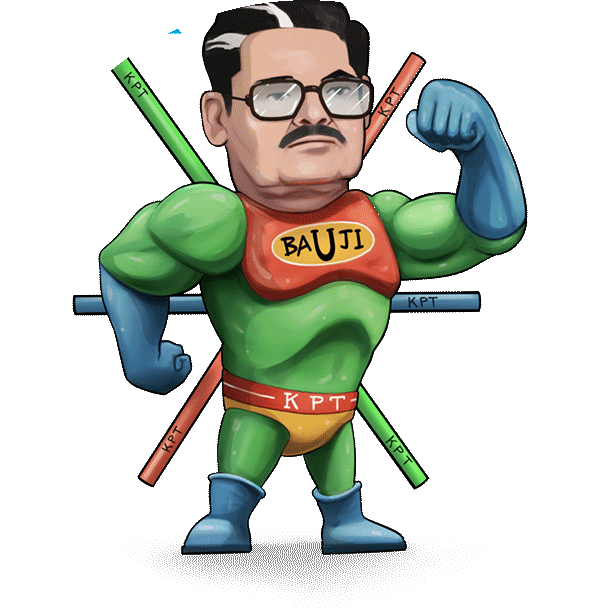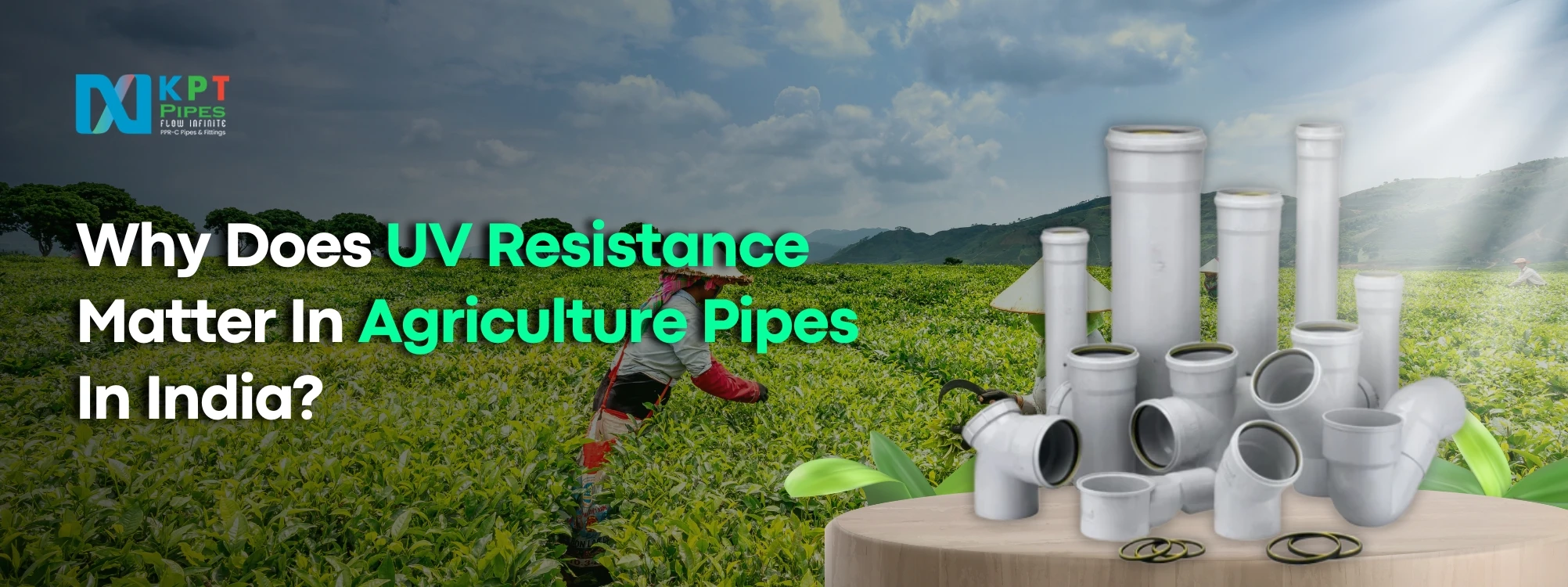Indian farms often rely on long, exposed runs of piping that run through open fields, orchards, and greenhouses. These agriculture pipes in India endure months of relentless sun, intense UV radiation, and constant and blistering heat. These conditions quietly eat away at unprotected plastics. It can make your irrigation lines turn chalky, split, or develop pinhole leaks mid-season. The damage that comes after it isn’t just cosmetic.
Every failure risks water loss, crop stress, and costly downtime during crucial irrigation windows. That’s why UV protection in irrigation pipes isn’t a luxury. It is indeed a necessity for long-term farm performance. UV-resistant agriculture pipes are designed to resist polymer breakdown under harsh sunlight. They are strong enough to retain their flexibility, strength, and flow capacity year after year.
Installing durable farm pipes in India is really important whether you are managing drip irrigation in a vineyard, sprinkler lines in paddy fields, or mainlines across a dairy farm. The right choice of piping infrastructure will in the end determine how often you replace them and how smoothly your irrigation seasons run.
But how important is UV resistance? Are they essential enough to invest that extra amount in purchasing sun-resistant irrigation piping? This article aims to cover everything, including the importance of using of such agriculture pipes in India and how their traits separate a short-lived purchase from a decades-long asset.
Table of Contents
ToggleImportance OF UV Resistance In Agriculture Pipes In India
Ultraviolet light from the sun triggers chemical reactions that break down polymer chains in plastic. This process, also known as photodegradation, causes brittleness, surface cracking, discolouration, and ultimately, structural failure. In India’s intense sunlight, unprotected pipes can degrade in just a couple of years. However, UV-resistant agriculture pipes in India are formulated to withstand these conditions far longer, ensuring you get maximum value from your investment.
1. Prevents Material Degradation
Leave a regular plastic bucket in the sun for a season, and you’ll see it fade, chalk, and crack. The same happens to unprotected pipes, but in these instances the stakes are much higher. But you can prevent such material degradation by choosing UV protected agriculture pipes in India.
UV protection in irrigation pipes works by embedding stabilizers such as carbon black or HALS (Hindered Amine Light Stabilizers) into the material. These additives used in irrigation infrastructure absorb and even neutralize harmful UV radiation before it can break polymer bonds.
You can ensure that your irrigation lines remain tough and flexible for many years by picking UV-stabilized agricultural pipes in India. Such pipes work wonderfully, even in regions with peak summer UV indexes above 11. Farmers who switch to these systems often notice that, while unprotected pipes show micro-cracks in the first year, UV-resistant one’s look and perform like new for multiple seasons. This helps save not only replacement costs but also the headache of mid-season repairs.
2. Extends Service Life
Pipe failure during peak irrigation is every farmer’s nightmare. Without UV stabilization, even high-quality plastics can erode and fray in less than one or two seasons. The result is an expensive premature replacement. However, the degradation process slows dramatically with sun-resistant irrigation piping. This extends the functional lifespan of the entire system.
For example, HDPE pipes with proper UV stabilization can retain most of their tensile strength for 20–30 years under direct sun. This translates to lower life-cycle costs, fewer interruptions, and a stable water supply that supports consistent yields. Simply put, investing in durable farm pipes in India is less about spending more today and more about avoiding years of recurring expenses tomorrow. So, why not invest in top quality agriculture pipes in India?
3. Minimizes Leak Risk During Hot Seasons
The peak summer season can make the walls of to expand due to extreme heat and pressure. If the pipe’s material has already been weakened by UV, this stress can cause sudden cracking, leading to leaks, water pooling, and erosion. Each leak would end up disrupting water pressure, wasting both time and resources.
By contrast, UV-resistant agriculture pipes in India retain their elasticity and structural integrity even during extreme heatwaves. This resilience ensures your irrigation system remains leak-proof when it’s needed most. The result is agriculture pipes in India that keeps your crops consistently hydrated and while protecting surrounding soil from damage.
4. Preserves Hydraulic Efficiency
Degraded pipes don’t just break instantly. They actually roughen from inside first. This roughness reduces water velocity and causes water pressure drops. The reduced water pressure causes the pumps to work harder, which in turn leads to consuming more energy. Even with all that end, the result is the end emitters that deliver uneven water volumes.
But you can rest easy with UV protection in irrigation pipes. These agriculture pipes in India preserve and retain their internal smoothness and maintain optimal hydraulic efficiency across the system. This means even the farthest drip points or sprinklers receive consistent pressure, crop coverage remains uniform, and energy bills stay in check. This efficiency gain can be a significant cost saver over the system’s lifetime, especially for farmers running large operations.
5. Protects Against Weather Fluctuations
India’s agricultural regions often experience daily temperature swings of 20 °C or more. This expansion-and-contraction cycle can weaken and degrade unprotected plastics, especially those already weakened by sunlight. Over time, tiny fissures that seem harmless are bound to grow into leaks.
But UV protected agriculture pipes in India are an excellent solution for it. Sun-resistant irrigation piping contains stabilizers that help the material flex without cracking, even after years of such thermal cycling. This weather resilience means your irrigation network remains reliable season after season, regardless of whether you’re in the heat of Rajasthan or the cooler nights of Himachal Pradesh.
6. Reduces Maintenance and Replacement Effort
Replacing field piping isn’t just expensive. It is actually a very disruptive process. Crops may need to be stepped on or removed, damaging them. Even the irrigation schedules can get delayed, leading to losses. Moreover, you may have to either divert the labour from more productive tasks like farming to less work or no work at all. But seasons change and don’t wait for anyone. This means if you miss the window to sow the crop or harvest it, losses are bound to occur.
But you can minimize such instances by installing UV-stabilized agricultural pipes in India. Such strong, durable, and resilient irrigation infrastructure can help farmers dramatically reduce repair frequency. That translates to fewer emergency call-outs, less field disruption, and more time spent on productive farming instead of troubleshooting leaks. The value here isn’t just financial. It will also offer operational value and more peace of mind.
7. Adds Long-Term Value to Your Farm Infrastructure
Think of UV-resistant agriculture pipes not as disposable items, but as long-term capital assets. Their durability in India’s harsh climate means they retain structural integrity. They also empower you to strengthen your farm’s infrastructure while increasing the property’s resale or lease value.
If you ever sell or lease your farm, an irrigation system built with sun-resistant irrigation piping would actually become a tangible asset that adds to the property’s value. This is due to its ability to maintain structural integrity, visual appeal, and operational performance over time. Potential buyers and tenants recognize that such systems outlast conventional alternatives and come with a lower maintenance burden. As a result, they are often willing to pay more for a system that’s proven to withstand India’s demanding conditions.
How Should Farmers Select the Right Agriculture Pipes in India?
Choosing the right piping is as much about planning as it is about purchase. Today, countless pipes, fitting and related products are available on the market. Farmers can feel overwhelmed by conflicting claims, technical jargon, and limited reliable guidance. The independent resources on picking the best agriculture pipes in India are already scarce. On top of that, local suppliers may push cheaper options without explaining the long-term consequences. But picking the wrong pipe can lead to constant repairs, water loss, and reduced yields, making it a costly mistake in the long run.
That’s why asking the right questions before purchase becomes essential. The process is not just about buying a product; it’s about securing a dependable irrigation backbone for your farm’s future. So, it is advantageous to ask the below-mentioned questions before making an expensive investment into irrigation system for your farm:
1) Always start by assessing your environmental conditions
Ask yourself, are your lines fully exposed to midday sun for months, partially shaded, or buried underground? Do they run through high-heat mulch zones or over reflective soils? UV protection in irrigation pipes should move to the top of your checklist in any case where sunlight is a factor.
2) Next, match materials to purpose
UPVC agriculture pipes in India offers stability and affordability if your piping runs are static and underground. On the other hand, HDPE excels in handling pressure changes and impacts for above-ground and flexible layouts. However, CPVC may prove to be ideal if your system uses hot water.
No matter the choice of material, you still always confirm that the grade is UV-stabilized if exposure is likely. Don’t just accept vague marketing claims! Instead, ask how many hours of UV exposure the product has been tested for and whether the results mimic real-world Indian conditions.
3) Considering brand credibility is one of the most crucial steps
Research and review if =the manufacturer of agriculture pipes in India have independent lab results for UV ageing? Can they point to case studies from farms in high-sun regions like Gujarat or Andhra Pradesh? Do they offer warranties that specifically cover UV-related damage? Real-world performance data is always worth far more than generic “UV-resistant” labelling. So, be proactive and check the same to find the ideal agriculture pipes in India.
4) Finally, weigh the economic trade-offs.
Yes, stabilizers add a small premium to the cost. However, that investment pays for itself over the years. Wondering how? They do so through reduced water loss, fewer repairs, and less downtime. In the long run, UV-resistant agriculture pipes in India are proven to deliver returns that far exceed the upfront price.
So, make sure you can answer these four questions with confidence before committing to one specific agriculture pipes in India:
- Does the manufacturer have verified UV test data?
- Is the pipe grade suitable for your water type and pressure needs?
- Will the installation environment expose it to significant sunlight?
- Does the warranty cover UV-related failures?
If the answer is “yes” to all four, you’re on track to building a piping system that thrives under India’s sun and not fails because of it.
Conclusion
Efficiency and sustainability are no longer optional in modern Indian agriculture. Instead, they are indeed critical to long-term viability. Farm irrigation infrastructure plays a central role in this particular equation. Hence, the pipes you choose will directly influence your farm’s productivity, operating costs, and resilience against climate challenges.
The right agriculture pipes in India do far more than transport water. They actually safeguard crop health, optimize resource usage, and protect your investment from premature failure. Selecting wisely also future-proofs your farm against rising input costs, stricter water regulations, and shifting weather patterns. It’s a decision that shapes not just your current yields, but your farm’s ability to thrive for decades.


